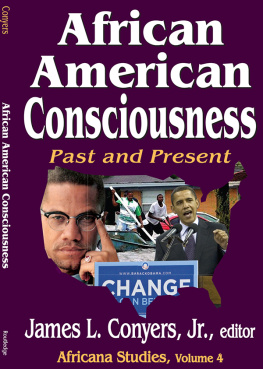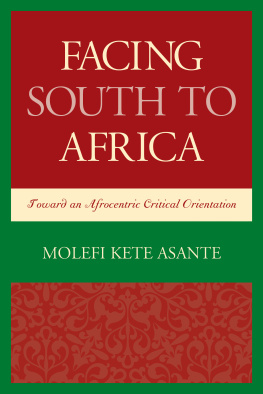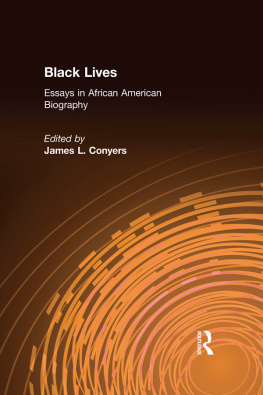First published 2008 by Transaction Publishers
Published 2017 by Routledge
2 Park Square, Milton Park, Abingdon, Oxon OX14 4RN
711 Third Avenue, New York, NY 10017, USA
Routledge is an imprint of the Taylor & Francis Group, an informa business
Copyright 2008 by Taylor & Francis.
All rights reserved. No part of this book may be reprinted or reproduced or utilised in any form or by any electronic, mechanical, or other means, now known or hereafter invented, including photocopying and recording, or in any information storage or retrieval system, without permission in writing from the publishers.
Notice:
Product or corporate names may be trademarks or registered trademarks, and are used only for identification and explanation without intent to infringe.
Library of Congress Catalog Number: 2007017373
Library of Congress Cataloging-in-Publication Data
Law, culture, and Africana studies / edited by James L. Conyers, Jr.
p. cm.
Includes index. ISBN 978-1-4128-0660-2
1. African AmericansStudy and teaching (Higher) 2. African AmericansSocial conditions. 3. African AmericansCivil rights. 4. African AmericansIntellectual life. 5. African American arts. 6. AfricaStudy and teaching (Higher) I. Conyers, James L.
E184.7.L392007
305.896073dc22
2007017373
ISBN 13: 978-1-4128-0660-2 (pbk)
Contents
Ula Y. Taylor
James L. Conyers, Jr.
Robert E. Weems, Jr.
Winston A. Van Horne
Cecil A. Blake
Delores P. Aldridge
Lewis R. Gordon
Ronald Turner
Africana Studies:
A Review of Social Science Research
Editor
James L. Conyers, Jr., University of Houston
Assistant Editor
Dr. Andrew Smallwood, Austin Peay University
Graduate Assistants
Kady Kante, Leah McAlister Shields, University of Houston
Book Review Editor
Dr. Christel Temple, Maryland at Baltimore County,
an Honors College
Editorial Board
Dr. Delores P. Aldridge, Emory University
Dr. Molefi K. Asante, Temple University
Dr. Cary Wintz, Texas Southern University
Dr. James Turner, Cornell University
Dr. Julius E. Thompson, University of Missouri at Columbia
Dr. James B. Stewart, Pennsylvania State University
Dr. Alan Colon, Dilliard University
Dr. Reiland Rabaka, California State University at Long Beach
Dr. Anthony Pinn, Rice University
Dr. Anthony Lemelle, University of Wisconsin at Milwaukee
Dr. Kobi K.K. Kambon, Florida A & M University
Dr. Shawn R. Donaldson, The Richard Stockton College of New Jersey
Dr. Gerald Home, University of Houston
Dr. Janis Hutchinson, University of Houston
Dr. Jane Dabel, California State University at Long Beach
Dr. W. Lawrence Hogue, University of Houston
Dr. Sundiata Cha Jua, University of Illinois at Champaign-Urbana
Dr. Fred Hord, North Carolina State University
Ula Y. Taylor
Why would anyone become a member of the Nation of Islam after the assassination of Malcolm X (El-Hajj Malik El-Shabazz) on February 21, 1965, in New Yorks Audubon Ballroom? More than any other leader, Malcolm X stood at the ideological vortex in the dynamic movement for black liberation. His fiercely smart rhetoric helped to shift the dominant political struggle from a strategy of civil rights liberalism to eclectic expressions of Black Nationalism. As the most charismatic and visible spokesperson for the Nation of Islam, Malcolm moved beyond the Honorable Elijah Muhammads (the Nation of Islams undisputed leader from 1934 to 1975) call for economic self-sufficiency nationalism. Combining an application of armed self-defense by any means necessary (in a political climate that hosed racist government repression in the form of the state police) along with a lethal critique of white folks as devils, Malcolm appealed to the most socially isolated, politically dispossessed, and economically desperate members of the black proletariat. It was Malcolms undivided commitment to create a powerful group of believers in the Nation of Islam that resulted in a substantial membership increase. In 1955, there were only sixteen temples largely located in the urban North, but by 1960 over fifty temples were sprinkled throughout the United States with registered membership estimated between 50,000 and 250,000.
Malcolm has become a militant martyr for the Nation of Islam and a Black Power paradigmthe archetype, reference point, and spiritual adviser in absentia for a generation of Afro-American activist. Clearly, Black Power advocates had multiple visions, but the Nation of Islam provides one of the most imaginative sites to explore their concerns about intimate gender relations, or what Paulette Pierce insight fully calls boudoir politics, and the creation of a black nation. This article is an effort to complicate our understanding of African-American identity, political subjectivity, gender prescriptions, and nation building during the peak of the modern Black Power movement. Furthermore, I suggest that in the post-Malcolm X period, the religious nature of the Nation of Islam was not the major impetus for new membership. Above all, the Nation of Islams secular programs, promising power and wealth, were the key to its expansion.
A Nation within a Nation
It is through a consideration of historical shifts in the Nation of Islam that one can locate key transformations and continuities in the meaning of Black Power. The formative years of the Nation of Islam (1930s) developed within a milieu of restrictive, second-class citizenship for African-Americans. W.D. Fard Muhammad, the founder and self-pro-claimed prophet of the Nation of Islam, was known by his followers as a divine black messiah (Allah in the flesh), and he designated Elijah Muhammad as his last Messenger.
The elevation of black Americans most notably above black Africans paralleled the collective gouging of Caucasians as white, blue-eyed devils who were grafted out of Black people specifically to bedevil the planet. Fard Muhammad advocated a separate nation from Caucasians, a place where its members were protected from a Jim Crow government and all of the sins from the devil. After he mysteriously disappeared in 1934 from Detroit (the Nation of Islams center), Elijah Muhammad continued this millennialistic mission to reject the devils institutions. A complete withdrawal from American society was presumed to be the key to the resurrection of black people. So, when President Franklin D. Roosevelt instituted social security in the late 1930s, the Messenger told his members to refuse the identification numbers since they were the mark of the beast. For Muhammad, social security digits not only kept individuals under surveillance but were also no different from the surnames black folks had inherited from slavery. Both systems of identification represented white domination. The federal government became redefined white domination.










